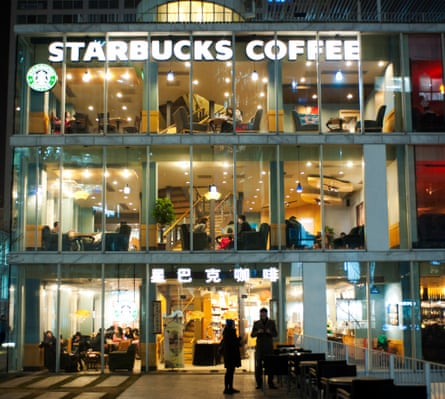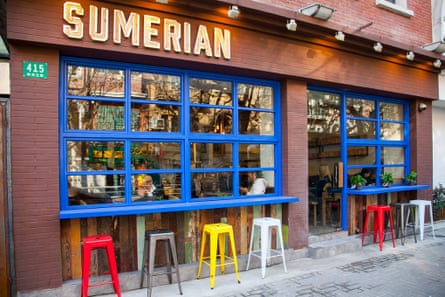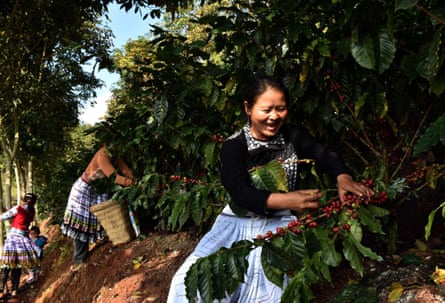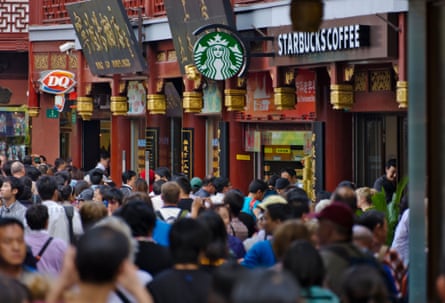Sun Mengyu is sitting at a table under a green parasol sipping an iced coffee waiting for her friend to arrive. The sun is shining and the seating area outside Starbucks in Xintiandi, an upmarket area of central Shanghai, is full with mostly young, fashionable, designer clothes-clad Chinese.
Sun is one of a growing number of Chinese people starting to drink coffee regularly and helping to make the Chinese coffee market the fastest growing in the world. China may be historically a nation of tea drinkers, but over recent years coffee has been becoming increasingly popular, particularly among younger people in big cities like Shanghai and Beijing.
Scaling up
At just four cups per person per year, the average consumption of coffee in China is still very low in comparison to the US and Europe, but given the economies of scale this still makes it a massive market.
International outlets like Starbucks and Costa can now be found in almost every big Chinese city. Both brands see China as a huge growth market. Starbucks, which opened its first Chinese coffee shop in 1999, has said it plans to double its store count in China to over 3,000 stores by 2019, while Costa plans to expand from 344 shops to 900 by 2020.

“Coffee culture has been developing in China,” says Esther Lau, a research analyst with market research firm Mintel. China’s massive and rapid urbanisation, along with a growing number of Chinese travelling overseas, are the factors she believes are behind the development of coffee drinking.
Taking on tea
Coffee is still a relatively new departure for China’s tea drinking population and sweet milky coffee drinks like mocha and lattes are the most popular. Sun at Starbucks says that while she likes milky sweet coffee, she is drinking an iced americano because it has fewer calories.
International coffee chains have adapted to Chinese tastes and include more blended and tea based drinks. A number of specials on offer at the Starbucks in Xintiandi include a green tea java chip frappuccino along with a green-tea flavoured cake.

In big cities such as Shanghai and Beijing, where coffee drinking has been popular for a number of years, an independent coffee scene is also starting to take hold. One such shop is Sumerian in Shanghai’s Jing’an district. Owned by Dave Seminsky, Sumerian focuses on high-quality coffee and hasn’t been tempted to offer the milky blends of Starbucks and Costa.
“We’ve held true to staying true to coffee. I don’t have bags of sugar and lots of milk hanging around,” said Seminsky. He admits that getting customers to change their behaviour has been one of their biggest challenges, but that by roasting their own beans they aim to offer a “premium experience”. Part of the price of a cup of coffee is “the experience of going into the store, we’re trying to differentiate from the big stores”.
Expensive tastes
While coffee is a staple everyday purchase for most office workers in the UK, it is considered a premium product in China and is a luxury out of reach of most average workers. In Starbucks in Xintiandi, a medium latte is 30RMB (£3.17), the same drink costs £2.60 in London. Starbucks has come under fire by state media in China for their high prices, especially as the cost of doing business is generally considered to be cheaper in China. The average monthly wage in Shanghai is 5891 RMB (£624), less than a third of the average wage in London, making a 30RMB cup of coffee a luxury most can’t afford.
A high price is considered a sign of quality in China, says Lau. “The more expensive the better. There is still this concept in China, and Starbucks and Costa realise this,” she adds. “They want to brand themselves as premium chains, that’s why they price slightly higher in China.”
Most of the coffee on sale in coffee outlets in China comes from imported beans. However, China is also growing as a producer of coffee, with the majority grown in Yunnan province in southern China.

Coffee was first introduced to Yunnan in 1892 when a French missionary brought the crop to the region. However, it is only since 2008 that it has been grown on a large scale as a commodity, according to Hu Lu, deputy secretary of the Coffee Association of Yunnan. “In the past five years, the production volume has increased steadily from 60,000 tons per year to nearly 120,000 tons,” says Hu.
Almost half the coffee produced in Yunnan comes from Puer, an area traditionally associated with tea production. According to Hu, tea and coffee are grown together in Puer and actually compliment each other. “The farmers choose to grow coffee because it’s more profitable than other crops like sugar cane,” says Hu, “that’s why it is developing so fast.”
The environmental costs
Like many other parts of China, Yunnan has issues relating to water scarcity and has suffered from droughts in recent years. Coffee is a very water intensive crop. In turn, demand for Yunnan’s coffee crops has outstripped supply, leading to further sustainability issues, according to research by the Wilson Centre on China’s coffee production. Much of the coffee grown in Yunnan is sun grown, which requires more fertilisers as well as water than shade-grown coffee.
Sustainability is a relatively new concept in China but one that is gaining traction, especially in relation to environmental protection as China attempts to clean up its environment after years of rampant economic growth. Foreign companies are increasingly making strides to ensure their investments and production in China comply with corporate social responsibility and sustainability standards.

Starbucks, for example, only buys shade-grown coffee in Yunnan as part of the Coffee and Farmer Equity (C.A.F.E.) standards the company implemented in 2011 in the area. “The C.A.F.E. practices programme is designed to address social and environmental issues on the ground in coffee producing regions,” said Semroc. These also include water conservation measures which, given China’s water scarcity issues, are particularly relevant in Yunnan.
Most of the coffee produced in Yunnan is exported, with only around 30% consumed domestically. This may change, however, with more interest from domestic coffee retailers, particularly the independent coffee sector such as Sumerian coffee. Currently Seminsky sources most of his beans from south and central America. While, Yunnan doesn’t offer the highest quality beans at the moment, he hopes eventually to be able to source his beans directly from farmers in China. It makes sense economically, he says, but also ethically and environmentally too.
The spotlight on commodities series is funded by the Fairtrade Foundation. All content is editorially independent except for pieces labelled “brought to you by”. Find out more here.
Join the community of sustainability professionals and experts. Become a GSB member to get more stories like this direct to your inbox.

Comments (…)
Sign in or create your Guardian account to join the discussion